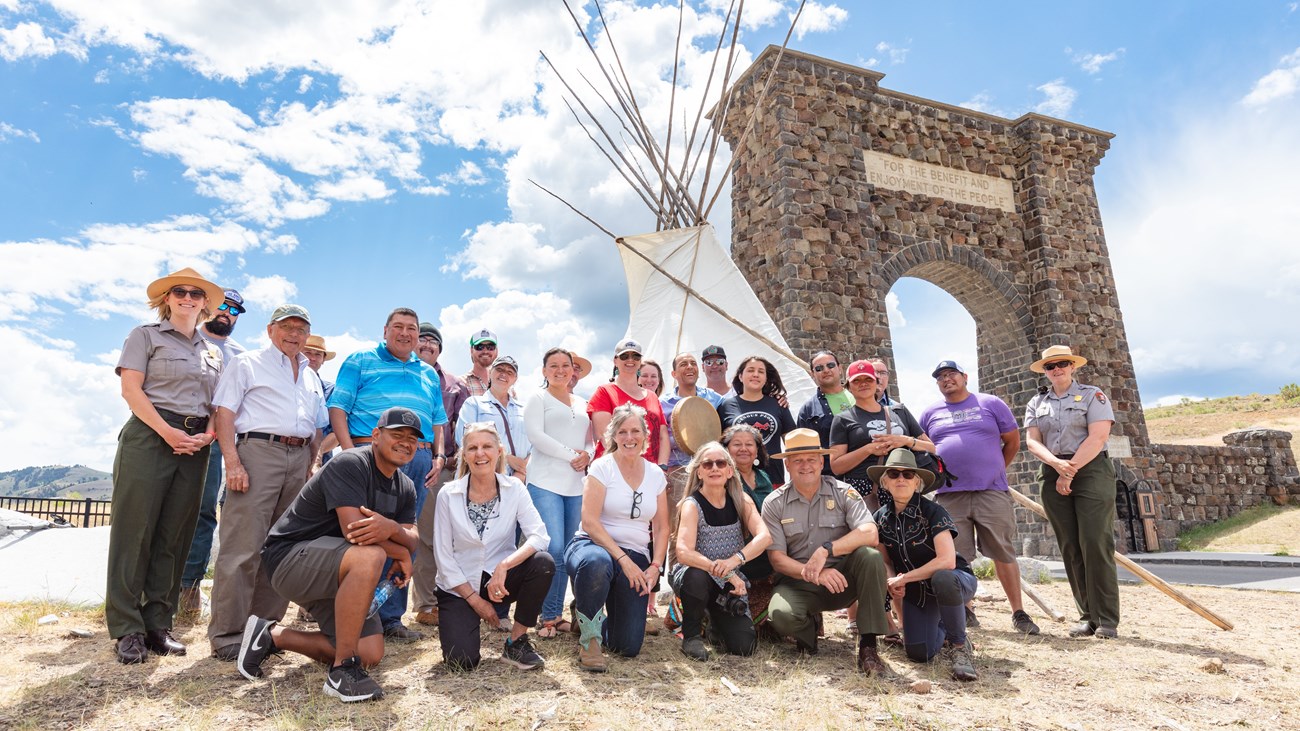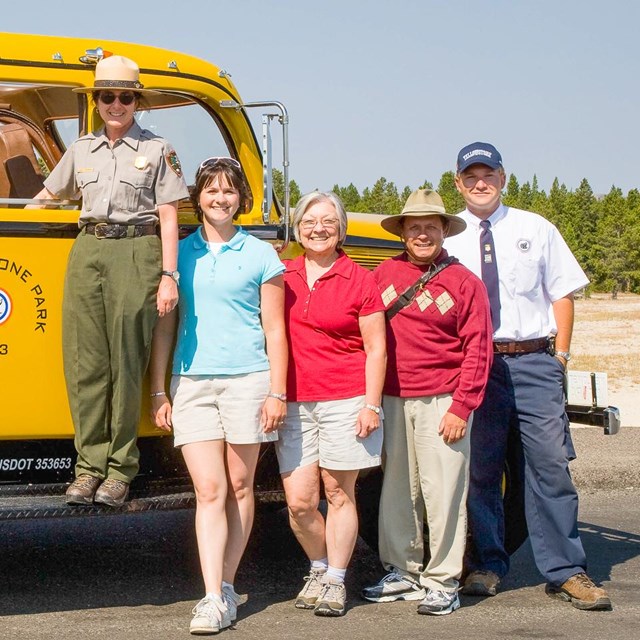
NPS / Jacob W. Frank Yellowstone’s success is predicated on strong partnerships and coalitions. This strategic priority centers on the park continuing to build and align priorities with a wide range of partners, including Tribes, elected officials, nonprofit groups, concessioners, communities, states, other federal cooperators, and the philanthropic community. 
Working with our PartnersThe park enjoys strong relationships with multiple major concession and commercial use operators. These partners were critical to Yellowstone’s success during 2021-2022. Particularly in working through and supporting the park as it worked to address impacts from the 2022 flood event, as well as continued impacts from the COVID-19 pandemic, park partners also continued to work closely with the park in many key areas beyond operations. Delaware North (Yellowstone General Stores)Delaware North installed a new fire detection and suppression system at Canyon Adventure Store, accomplished exterior restoration on Fishing Bridge Dorm, and continues to work closely with the park to make upgrades to employee housing and other infrastructure. MedcorMedcor provided substantial support for employee and visitor COVID-19 testing, vaccinations, and medical aid. Due to flood impacts and difficulties in accessing the Mammoth Clinic, Medcor also set up a mobile clinic in the parking lot at the Yellowstone Forever facility in Gardiner to ensure continued medical service access for residents in areas north of the park and visitors. STG InternationalIn 2023, STG International was awarded a contract to operate three urgent care clinics within Yellowstone, providing substantial support for both employee and visitor medical emergencies and routine care. Yellowstone Park Service StationsYellowstone Park Service Stations (YPSS) continues to work with the park to provide fuel, vehicle towing, roadside assistance, and repair to tens of thousands of vehicles per year. YPSS is also exploring ways of incorporating new electric vehicle charging stations to provide better electric vehicle access to the park. Xanterra Parks and Resorts (Yellowstone National Park Lodges)Xanterra Parks and Resorts completed the renovation of Fishing Bridge RV Park in 2022 and reopened it after two years of construction. The RV park has double the capacity, larger sites, larger parking lot, a new dump station and recycling area, four new accessible comfort stations, and an expanded registration building with more showers and laundry facilities. Xanterra also initiated a renovation project at Lake Lodge cabins and several other facility projects. Yellowstone has a large congressional delegation with 10 Members of Congress representing the park’s four congressional districts across three states. Yellowstone also coordinates with state and local elected officials in Montana (Park and Gallatin counties), Wyoming (Park and Teton counties), and Idaho (Fremont County). The park received tremendous support from the congressional delegations and committee staff, state, and local elected officials in Wyoming, Montana, and Idaho during the 2022 flood event and recovery. The park briefed 115 congressional members and staff on the flood recovery progress. The park partners with the Federal Highway Administration (FHWA) Western Federal Lands Division on a wide range of major transportation projects. This partnership has completed hundreds of millions of dollars in projects over the past decade. The strength of this partnership was on full display in 2022 with the flood response required to plan, design, and execute the repairs on the Northeast Entrance Road and the Temporary North Entrance Road. The park received $60 million from the FHWA Emergency Relief Federally Owned Road (ERFO) program. The park has partnered closely with the Greater Yellowstone Coalition (GYC) in recent years. In 2021, the GYC, Yellowstone Forever, and the park partnered to expand bison conservation capacity and are continuing to look for additional partnership opportunities moving forward. In 2022, the park partnered with GYC to increase Tribal outreach and commemorate Yellowstone’s 150th anniversary. GYC supported a gathering hosted by the Eastern Shoshone and the Northern Arapaho Tribes to commemorate the anniversary and discuss collaboration between federal managers and Tribal Nations. The Greater Yellowstone Coordinating Committee (GYCC) was established in 1964 to help facilitate cooperation between the federal agencies within the Greater Yellowstone Ecosystem (GYE). Through the GYCC, federal land managers pursue voluntary opportunities to cooperate at the landscape scale. In 2020, the GYCC incorporated state partners and focused on setting new strategic priorities around three goal areas: 1) Maintain resilient landscapes within the GYE; 2) Respond to increased visitor use; and 3) Strengthen coalitions, partnerships, and communications. The GYCC has nine subcommittees collaborating on critical work and resource areas across the ecosystem. Each year, GYCC subcommittees execute up to $250,000 in ecosystem-scale projects funded by the federal land units while also executing and coordinating critical work on their home units that contribute to the health of the broader ecosystem. The park continued working closely with Tribal, state, local, and federal partners to manage bison exiting the park during the winter months. These partners work closely together to manage this highly complex wildlife management issue. The Interagency Bison Management Plan continues to adaptively evolve through increasing coordination and collaboration to meet bison management objectives. Nine Tribes have participated in bison hunts outside Yellowstone. Through youth and young adult partnerships with Montana Conservation Corps (MCC) and Groundwork USA, the park hosted teens and young adults to complete priority work projects and data collection. MCC brought five crews for 10 weeks of work in 2021-2022. As an urban youth corps in cities across the country, Groundwork USA brought four crews of nine diverse youth each August to continue the work YCC had started. Crews installed bear boxes, replaced boardwalks at Norris Geyser Basin, and rebuilt the Firehole Canyon Swimming Area stairs. The park has partnered with MCC for at least 20 years and Groundwork for 12 years. As the official nonprofit partner of the National Park Service, the National Park Foundation (NPF) worked closely with Yellowstone in 2022 to provide critical funding for a range of conservation priorities. The foundation secured over $1.7 million for native fish restoration, Indigenous Bison Program Interns, recycling stations, and key 150th anniversary initiatives, such as the Yellowstone Tribal Heritage Center, Yellowstone Revealed, and Black People Who Hike visit. In 2022, the National Parks Conservation Association (NPCA) and the park strengthened and broadened their partnership. NPCA supports key conservation and infrastructure issues within the park and they played a critical role in Yellowstone’s 150th anniversary. Most notably, NPCA supported Yellowstone Revealed and, in partnership with the park and Salish Kootenai College, launched a Tribal fellowship program that will continue beyond the anniversary. Since 2008, park personnel have coordinated with NPCA and Montana Fish, Wildlife and Parks to improve migratory pathways for pronghorn and other wildlife between the park and historic winter ranges to the north in the southern Paradise Valley. More than 1,000 volunteers organized by the NPCA removed or modified about 20 miles of unnecessary fences and modified or rebuilt other fencing to eliminate obstacles to movements while still meeting landowner needs. Northwestern Energy (NE) partnered with Yellowstone in a variety of critical areas in 2021-2022. NE continued to assist the park in upgrading decades-old utilities within developed areas to support the park’s housing improvement project and built a new solar array to provide power to Bechler Ranger Station. NE also provided critical support during the emergency flood recovery efforts and restored power back to the park within 48 hours. The Property and Environmental Research Center supported the park in a variety of key areas, including the park’s deferred maintenance backlog, improving employee housing, managing increasing visitation, and 150th anniversary planning efforts. The park relies on a variety of research, education, and nonprofit partnerships with Montana State University Bozeman, Brown University, Rice University, Oceanographic Institute, University of Utah, University of Victoria, University of Wyoming, University of Montana, University of Maryland, and University of California. The park partnered regularly with state historic preservation officers, primarily in Wyoming, to guide and inform important cultural and historic preservation decisions. American Indians have been living in and connected to the landscape now known as Yellowstone for at least 11,000 years. Today, there are 27 associated Tribes who have historic and modern connections to the lands and resources now found within the park. These partnerships are essential to ensuring the park is honoring its Trust responsibilities to the Native American heritage associated with Yellowstone. In 2021, the National Park Service and the U.S. Public Health Service (USPHS) commemorated their 100-year partnership anniversary. USPHS provides services that include surveying drinking water and wastewater systems, inspecting food vendors, and responding to and preventing illness outbreaks. Warfighter Outfitters, a nonprofit organization supporting U.S. combat veterans, established a partnership with the park starting in 2009. In 2021, The park hosted 35 volunteers to work on constructing horse corrals in the Canyon and South Entrance areas. Their rehabilitation and construction projects have contributed nearly 200,000 hours of volunteer labor totaling $4.8 million and over $1 million in materials funded by grants from their partner, Arch Venture. Yellowstone Forever (YF) is the park’s official nonprofit partner and provides a wide range of support in helping achieve conservation, education, and visitor-experience priorities. Through its philanthropic efforts, education, and strategic partnerships, YF is committed to protect, preserve, and enhance the park for future generations. In 2022, YF raised more than $9.4 million in support of 25 crucial park projects, including the bison conservation and Tribal internship program; wolf, bear, cougar, and other wildlife conservation projects; youth education; and many more. 
Yellowstone "Partnerships" NewsMore Information
Other Strategic Priorities
|
Last updated: August 13, 2025








